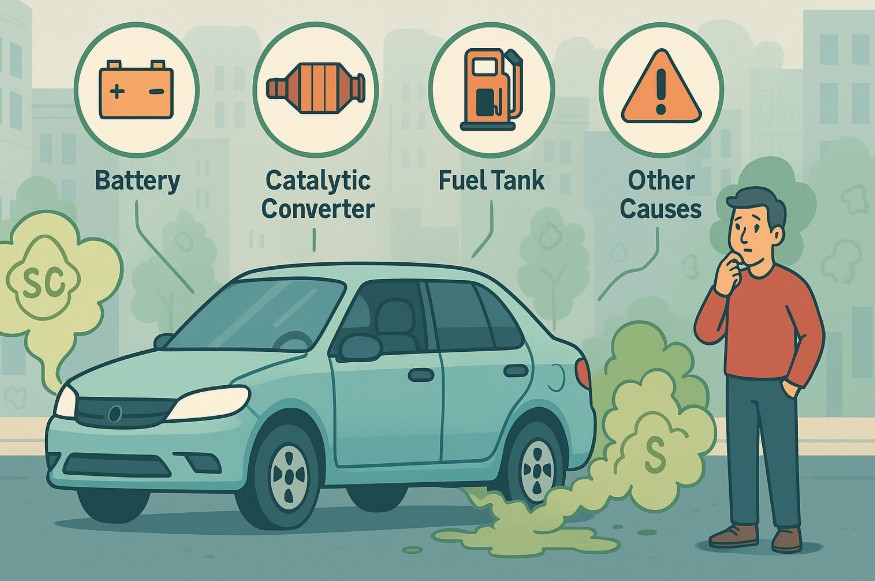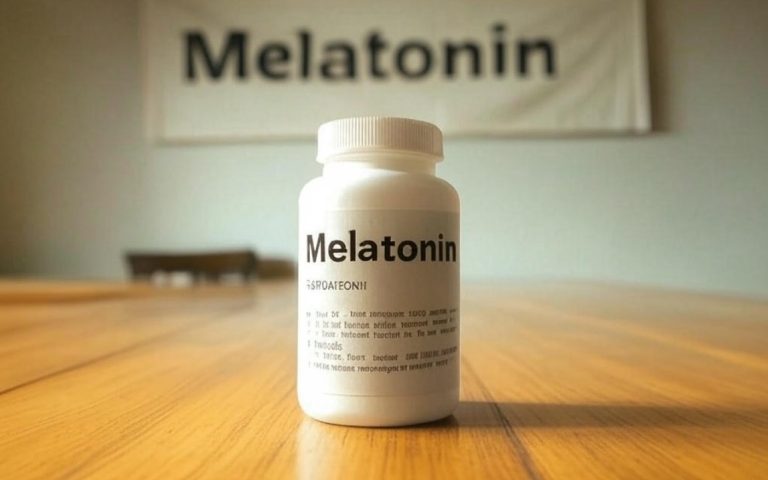Why Does My Car Smell Like Rotten Eggs? | 15 Common Reasons
It’s never a good sign when your car smells like rotten eggs. This foul odour, often compared to the stench of sulphur or spoiled eggs, can point to a range of mechanical problems. The source of the smell is typically hydrogen sulphide, a compound found in small amounts in fuel.
Under normal circumstances, this is converted into odourless sulphur dioxide by your car’s catalytic converter. However, when a fault arises in the exhaust, fuel, or emissions systems, the smell can become overwhelming.
So, if you’ve asked yourself, “Why does my car smell like rotten eggs?”, you’re in the right place.
15 Common Reasons Your Car Smells Like Rotten Eggs
1. Faulty Catalytic Converter
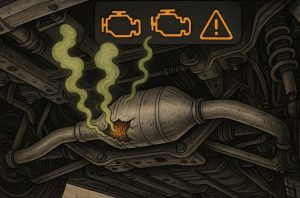
What it is?
The catalytic converter is part of your car’s exhaust system and is responsible for converting harmful gases like hydrogen sulphide into less harmful substances before they exit the tailpipe.
Why it causes the smell?
When it fails or becomes clogged, it can no longer convert hydrogen sulphide into odourless sulphur dioxide. As a result, the pungent, sulphuric smell escapes through the exhaust. A failing converter may also cause a drop in fuel efficiency or trigger the check engine light.
How to fix it?
- Inspection: Have a mechanic perform an emissions test and visual inspection.
- Repair/Replacement: If it’s clogged or damaged, the only solution is replacement.
- Cost: Replacing a catalytic converter in the UK can range from £300 to £1,000 depending on make and model.
2. Bad Fuel or Contaminated Petrol
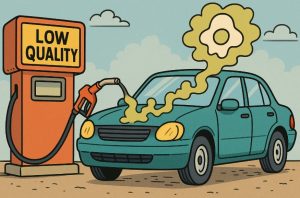
What it is?
Not all fuel is created equal. Fuel contaminated with water, excess sulphur, or other chemicals can interfere with proper combustion.
Why it causes the smell?
Low-quality or contaminated fuel may burn improperly, creating excess hydrogen sulphide that the catalytic converter cannot handle, resulting in a rotten egg smell.
How to fix it?
- Drain and flush the fuel tank: This removes contaminated fuel.
- Use high-quality fuel: Refill with fuel from a reputable station.
- Add a fuel additive: Products like Redex or STP Fuel System Cleaner can help clean injectors and improve combustion.
- Have the fuel system inspected: A mechanic can check for other issues, especially if the problem persists after changing fuel.
3. Worn-Out Fuel Pressure Regulator
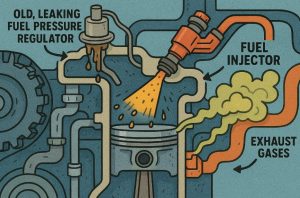
What it is?
The fuel pressure regulator controls how much fuel is delivered to the engine’s combustion chamber.
Why it causes the smell?
A faulty regulator can cause the engine to run too rich (too much fuel). This overloads the catalytic converter, preventing it from processing the extra fuel and allowing the rotten egg smell to escape.
How to fix it?
- Diagnosis: Your mechanic will test the fuel pressure using a pressure gauge.
- Replacement: If the regulator is worn out, it will need to be replaced.
- Cost: Fuel pressure regulator replacements typically cost between £120 and £250, including labour.
4. Failing Battery or Acid Leak
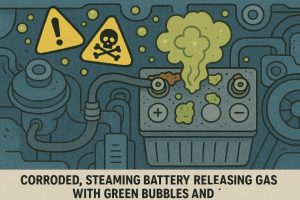
What it is?
The car battery, particularly lead-acid types, contains sulphuric acid. When overcharged or damaged, it can leak or release gases.
Why it causes the smell?
An overcharged battery heats up and releases hydrogen sulphide gas, producing a strong rotten egg smell, especially near the front of the car or under the bonnet.
How to fix it?
- Check for corrosion or leakage: Look at the battery terminals and surrounding areas.
- Test the voltage output: Use a multimeter or have your mechanic test the battery.
- Replace if leaking or overcharged: Don’t attempt to fix a leaking battery—replacement is the safest option.
- Ensure your alternator isn’t overcharging: Overcharging is often the root cause, so have the charging system checked too.
5. Malfunctioning Oxygen Sensor
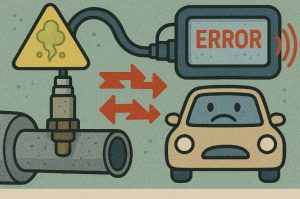
What it is?
The oxygen sensor monitors the ratio of fuel to air in the combustion chamber and sends this information to the car’s ECU (engine control unit).
Why it causes the smell?
A faulty sensor may incorrectly report the fuel/air mixture, leading the ECU to enrich the fuel mixture. Too much unburnt fuel can overload the catalytic converter, causing sulphur-like smells.
How to fix it?
- Diagnostic scan: A mechanic can detect a faulty oxygen sensor using an OBD-II scanner.
- Replace the sensor: This is often a straightforward and inexpensive fix.
- Cost: Typically between £80 and £180, depending on your vehicle’s make and whether it uses upstream or downstream sensors.
6. Overheating Catalytic Converter
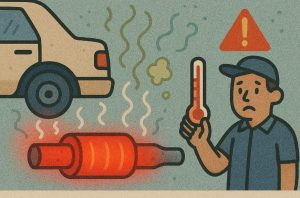
What it is?
When the catalytic converter gets too hot, it can begin to melt internally or become completely clogged.
Why it causes the smell?
Overheating can occur due to engine misfires or unburnt fuel entering the exhaust system. This increases hydrogen sulphide levels and causes the converter to fail, leading to the distinctive rotten egg odour.
How to fix it?
- Stop driving immediately: Continued use can cause severe engine or exhaust damage.
- Diagnose underlying issues: Fix misfires, fuel leaks, or rich fuel mixtures first.
- Replace the converter: If it’s already damaged or melted, it will need replacing.
- Check cooling system: Sometimes cooling failures contribute to overheating, so ensure all systems are functioning correctly.
7. Engine Misfire or Poor Combustion
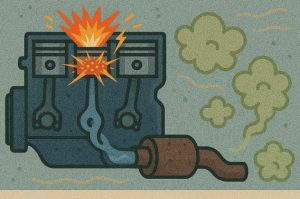
What it is?
An engine misfire occurs when one or more cylinders fail to ignite the fuel properly. This can be due to bad spark plugs, ignition coils, or fuel injectors.
Why it causes the smell?
Misfiring leads to incomplete combustion, which means excess fuel passes into the exhaust system. This extra fuel puts stress on the catalytic converter and can cause it to emit sulphur-based gases.
How to fix it?
- Run a diagnostic scan: This will often reveal which cylinder is misfiring.
- Check spark plugs and ignition coils: Replace worn components.
- Inspect fuel injectors: Clean or replace faulty injectors.
- Fix vacuum leaks: Air/fuel mixture imbalances can also cause misfires.
- Cost: Fixing a misfire may cost between £100 and £300, depending on the cause.
8. Clogged Fuel Filter
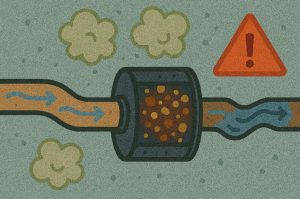
What it is?
The fuel filter ensures that only clean fuel reaches the engine by trapping debris and contaminants from the fuel tank.
Why it causes the smell?
A clogged filter restricts fuel flow, causing the engine to run rich (too much fuel, not enough air). This overwhelms the catalytic converter, leading to unprocessed hydrogen sulphide emissions and that classic rotten egg smell.
How to fix it?
- Fuel pressure test: A mechanic can test flow pressure to determine clogging.
- Replace the filter: This is a routine maintenance item that should be replaced every 20,000 to 40,000 miles (check your car’s manual).
- Cost: Replacement in the UK usually ranges from £50 to £150.
9. Transmission Fluid Leak
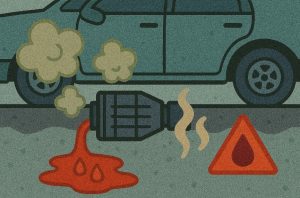
What it is?
Transmission fluid is a hydraulic fluid that helps your gearbox operate smoothly and stay cool.
Why it causes the smell?
If transmission fluid leaks and drips onto hot engine or exhaust components, it can burn and produce a sulphur-like, chemical odour. The smell is often mistaken for rotten eggs.
How to fix it?
- Look under the car for pinkish-red fluid: This is a tell-tale sign of a transmission leak.
- Seal inspection and repair: A mechanic can locate and fix the leak — often it’s a worn gasket or seal.
- Top up or change fluid: If fluid levels are low, a refill or flush may be needed.
- Cost: Transmission leak repairs range from £100 to £300, depending on the complexity.
10. Exhaust System Leaks
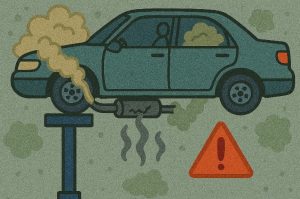
What it is?
The exhaust system carries gases from your engine to the rear of the car, passing through filters like the catalytic converter to reduce emissions.
Why it causes the smell?
If there’s a leak before the catalytic converter, hydrogen sulphide and other noxious gases can escape directly into the atmosphere or even into the cabin through vents.
How to fix it?
- Inspection for rust, cracks or loose joints: Especially on the manifold or exhaust pipes.
- Repair or replace damaged sections: Exhaust sealants can be temporary fixes, but welding or replacement is often needed for a long-term solution.
- Cost: Exhaust repairs can range from £70 to £400 depending on the part and labour involved.
11. Car Smells Like Rotten Eggs When Idle

What it is?
This is a condition-specific issue where the odour is strongest while the vehicle is stationary and running.
Why it causes the smell?
Idle time causes a build-up of exhaust gases. If your car is running rich, the excess fuel entering the catalytic converter can cause it to heat up and release hydrogen sulphide. It’s more noticeable when the car isn’t moving and airflow is limited.
How to fix it?
- Check idle air control valve (IAC): If this valve fails, the engine may run rough at idle.
- Inspect spark plugs and injectors: Ensure efficient combustion even when idling.
- Clean or replace air filters: Poor airflow contributes to rich fuel conditions.
- Professional diagnostic: If unsure, have a mechanic inspect emissions and idle performance.
12. Issues with the EVAP System (Emissions Control)
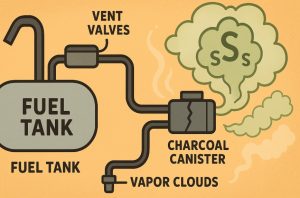
What it is?
The Evaporative Emission Control System (EVAP) prevents fuel vapours from escaping the fuel tank into the atmosphere.
Why it causes the smell?
A broken purge valve, vent valve, or charcoal canister can allow fuel vapours to leak, creating a sulphur smell around the car, particularly near the back.
How to fix it?
- OBD-II scan: An error code (like P0440 or P0442) will usually indicate an EVAP fault.
- Check gas cap tightness or damage: This is often overlooked but easily fixed.
- Replace faulty EVAP parts: Canisters, valves, and lines are replaceable.
- Cost: EVAP system repairs range from £60 to £250.
13. AC or Ventilation System Odour
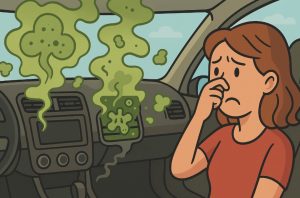
What it is?
The car’s air conditioning system can collect moisture, dirt, and bacteria over time, especially when filters go unchanged.
Why it causes the smell?
Bacteria or mould in the evaporator core or air vents can emit a rotten smell similar to sulphur. It may not be hydrogen sulphide, but the effect is just as unpleasant.
How to fix it?
- Change the cabin air filter: This should be done every 12,000 to 15,000 miles.
- Use an AC system cleaner: Spray antibacterial treatments into vents and air intakes.
- Have the AC professionally cleaned: For persistent smells, a deep clean is best.
- Cost: Cabin filter replacements are around £15–£50. Full AC cleaning costs can vary from £60–£120.
14. After an Oil Change
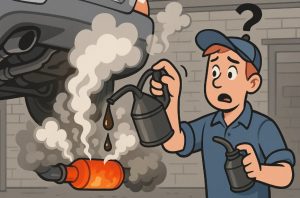
What it is?
Oil changes involve draining old oil and replacing the filter. Spills can happen, especially if not done carefully.
Why it causes the smell?
If oil drips onto hot parts of the engine (like the exhaust manifold), it can burn and release pungent smells, sometimes interpreted as sulphuric.
How to fix it?
- Wipe excess oil after changes: Especially near the oil cap and filter.
- Check for oil leaks post-change: Make sure the oil plug and filter are secure.
- Run the engine for a few minutes: Then inspect the area for drips.
- Seek professional help for recurring leaks: You may need new gaskets or seals.
15. Fuel System Problems
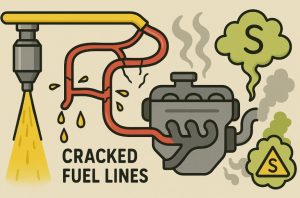
What it is?
The fuel system includes injectors, lines, pumps, and filters that work together to deliver petrol to the engine efficiently.
Why it causes the smell?
Leaky or dirty fuel injectors can cause uneven fuel delivery, leading to unburnt fuel and excess hydrogen sulphide in the exhaust. Cracked lines may also allow fuel vapours to escape.
How to fix it?
- Use a fuel system cleaner: Additives can clean minor deposits in injectors.
- Inspect for leaks: Fuel lines and injector seals should be tight and dry.
- Have injectors professionally cleaned or replaced: Especially if rough idling or hesitation occurs.
- Cost: Injector cleaning starts from £60; replacement can be £100–£300 per injector.
How Can You Diagnose the Sulphur Smell in Your Car?
While some problems are obvious, others may require more in-depth investigation. Here’s how to start diagnosing:
- Check under the bonnet: Look for corrosion around the battery or leaking fluid.
- Smell location: Is it coming from the vents, bonnet, or tailpipe? This can help identify the source.
- Look for dashboard warnings: A check engine light often indicates emissions-related issues.
- Listen for changes: Odd engine noises or rough idling can point to fuel or ignition problems.
If the odour persists or worsens, it’s wise to visit a professional mechanic.
What Can You Do to Prevent the Rotten Egg Smell?
Prevention always starts with routine car care. Here are some key actions:
- Use quality fuel: Stick to reputable petrol stations.
- Schedule regular maintenance: Get your exhaust, fuel, and battery systems checked periodically.
- Change filters on time: Both fuel and cabin air filters should be replaced according to manufacturer guidelines.
- Keep the catalytic converter in check: Have it inspected during your MOT or service.
- Avoid prolonged idling: This can lead to build-up in the exhaust and fuel systems.
What Are the Quick Fixes for Common Rotten Egg Smells?
| Cause | Symptoms | Possible Fixes |
| Faulty Catalytic Converter | Smell during acceleration, reduced mileage | Replacement or repair |
| Battery Acid Leak | Smell under bonnet, corroded terminals | Battery inspection, clean or replace |
| Bad Fuel | Smell after refuelling, engine knocking | Drain tank, use quality petrol |
| Oxygen Sensor Failure | Check engine light, poor mileage | Replace oxygen sensor |
| Clogged Fuel Filter | Engine hesitation, smell on startup | Filter replacement |
| Transmission Fluid Leak | Burning smell under car | Seal or gasket replacement |
| Mould in AC | Odour when turning on A/C | Clean vents, replace cabin filter |
What Should You Keep in Mind If Your Car Smells Like Rotten Eggs?
Don’t ignore the signs. While a rotten egg smell may seem minor, it often signals a deeper issue within your car’s exhaust, battery, or fuel systems. The longer it’s left unchecked, the higher the chances of engine damage or costly repairs.
Early diagnosis and regular car care can not only fix the problem but also extend the life of your vehicle. If in doubt, always turn to a professional for peace of mind.
FAQs
What part of the car causes a sulphur smell?
The catalytic converter is most often responsible, but it can also stem from fuel system issues, a bad battery, or emissions faults.
Can a car battery cause a rotten egg smell?
Yes. An overcharged or leaking battery releases sulphuric acid vapours, which smell like rotten eggs.
Is it safe to drive if my car smells like rotten eggs?
While not immediately dangerous, it’s a sign of a problem that should be addressed quickly to avoid more serious issues.
How do I get rid of the rotten egg smell in my car?
Start by diagnosing the source common fixes include replacing the catalytic converter, changing fuel, or fixing leaks.
Does bad petrol cause a sulphur odour?
Yes. Contaminated or low-quality petrol can lead to incomplete combustion and sulphur-like smells.
Why does my AC smell like rotten eggs?
This could be caused by mould or bacteria in the vents or cabin air filter. Cleaning and filter replacement can help.
What are signs of a bad catalytic converter?
Common signs include reduced engine performance, the smell of sulphur, and the check engine light illuminating.

